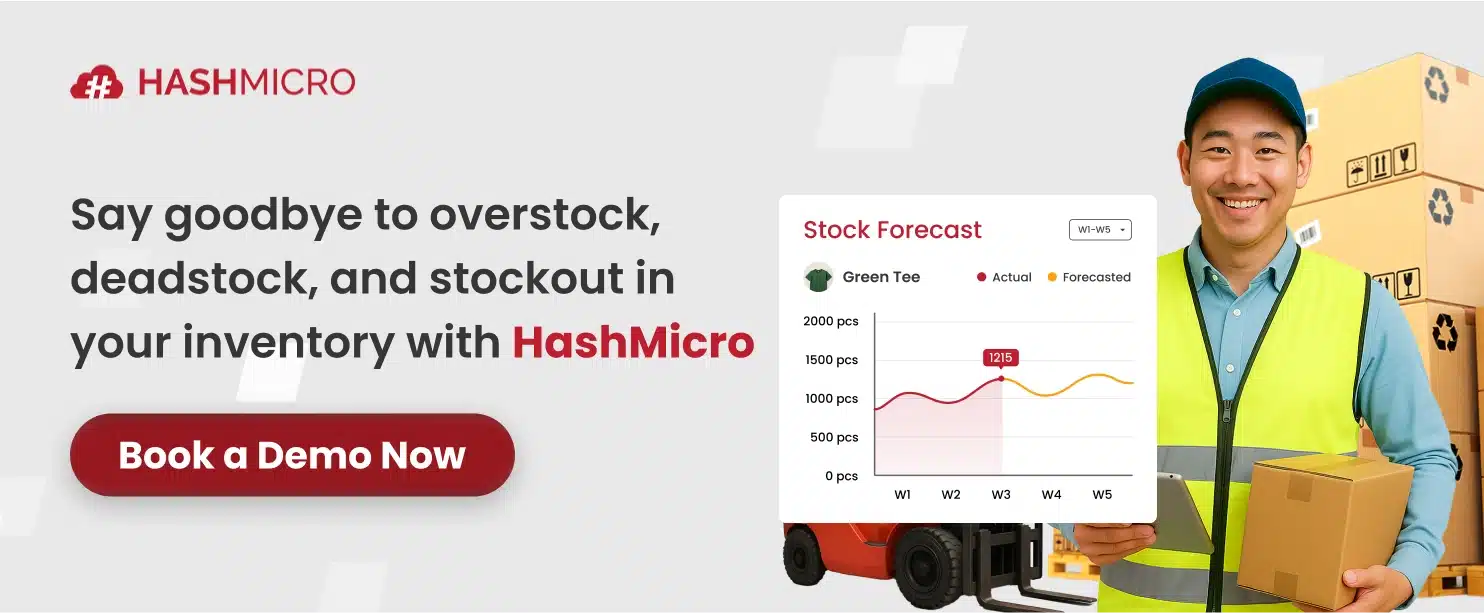Ever wondered how a product travels from the manufacturer to your hands? This journey involves complex processes and distribution channels, which can be streamlined with the right distribution software to ensure efficient and seamless delivery to consumers.
A distribution channel is a system companies use to deliver products or services to consumers. Effective distribution lines are crucial for operations, especially in managing inventory to prevent product expiration and optimize warehouse management.
For enhanced efficiency, consider HashMicro Inventory Management Software, which offers real-time tracking, automated stock management, and seamless integration. These features improve inventory accuracy, reduce waste, and ensure timely product delivery, optimizing your distribution channels.
Key Takeaways
|
Table of Content:
Table of Content
Distribution Channel Meaning

A distribution channel is a series of distributions or shipments of goods to various parties or locations, where each intermediary in the chain relies on the others. The manufacturer determines the medium for the distribution process to its consumers.
This medium can include distributors, agents, wholesalers, and more. Maintaining this distribution process from the producer to the consumer is crucial, and implementing an efficient distribution management system is key. Such a system ensures that the products remain in optimal condition throughout the journey until they finally reach the end consumer.
Distribution Channel Function
The primary function of a distribution system is to distribute goods and services to consumers. Furthermore, Simon Hudson stated other distribution functions that are in line with the primary role, namely:
1. Information
Distribution channels allow companies to collect important information about consumers and competitors. Therefore, this information will help the company plan its future business.
2. Negotiation
The process to reach an agreement between the company and the buyer will occur when distributing the product. The company and the buyer often need to agree on the price and requirements for product movement. The agreement then allows the transfer of title to the goods to the buyer.
3. Promotion
The distribution allows companies to convey product value through persuasive communication to consumers. As a result, people will be more familiar with the company’s products. After understanding more about a product, the possibility of people buying the product will increase.
4. Ordering
The distribution channel, in this case, acts as an intermediary for the process of ordering goods, starting from the bottom track and continuing to rise at the top level to reach the producer—for example, a distributor who orders goods from a company.
5. Payment
The payment process for every transaction occurs from consumers to producers according to the agreement of both parties. Generally, manufacturers accept bill payments through banks.
6. Finance
The function of finance is to utilize funds for various costs used in the distribution process. Companies will have difficulty calculating expenses manually. A manual calculation will be confusing because it concerns various aspects and parties. The company can automate its operational systems to avoid confusion with ERP finance software.
Related Article: The Ultimate Guide to Warehousing: Warehouse & Inventory Management
Distribution Channel Stages
The distribution of goods involves not only one but several parties. Therefore, a distribution channel needs to go through several stages in its implementation. These stages include the following:
1. Manufacturer
A producer is an owner who wants to sell their product to a distributor. Therefore they are responsible for ensuring the availability of products. Moreover, manufacturers must ensure that the distribution of goods is carried out optimally. They also have to make agreements with distributors so that product delivery can run smoothly.
2. Distributor
Distributors are usually involved in a direct transaction with the manufacturer. They will then resell the product to wholesalers and retailers. Distributors generally purchase products from various manufacturers to resell them at a lower price.
3. Sub-distributor
The next stage is the sub-distributor. Sub-distributors act as product buyers from the main distributor. Furthermore, the leading distributor has determined the expenditure and distribution point of the product. That said, the sub-distributor acts more as the product’s successor from the hands of the main distributor.
4. Wholesaler
Wholesalers are entrepreneurs who buy large quantities from distributors to resell them. They can sell products to several merchants, varying from wholesalers to retailers.
5. Retailer
Retailers are constantly engaged with end-level consumers in particular. Retail traders sell their products directly to consumers, who will not resell them. Generally, retailers even inform consumers not to resell the products.
6. Consumer
Consumers are final-level buyers of the product. This party usually uses goods and services to meet their needs. Each consumer’s personal needs and goals are certainly different from one another.
Try the HashMicro pricing calculator now to see how HashMicro’s best distribution software can optimize your distribution operations. Discover the right solution and find out if HashMicro is the best choice for your business needs.
Defining Factor of Distribution Channel
The distribution activities certainly can not be done without consideration. This channel has several determining factors, namely:
1. Market
Determination of market demand helps determine the target market in the distribution of products. This factor is critical so that the goods can reach the right target.
2. Determination of goods
Companies, as sellers, must consider the quality of goods, such as their weight. Of course, companies will consider a strategy to manage high shipping costs for heavy goods in the distribution process.
3. Determination of the company
A company will influence various decisions as a provider of goods or products. The company must be able to buy, distribute, and supervise goods. Supervision by the company is vital so that the goods will arrive safely into the hands of consumers.
4. Determining the intermediary
The company has the authority to determine the intermediary. As a result, this authority means the company must provide services for consumers purchasing goods.
Types of Distribution Channel

The distribution channel is not absolute. There is not only one method of distributing goods or services. In practice, the company applies various kinds of product distribution to its business activities. WallStreetMojo stated that a product movement can be direct or indirect.
1. Producer-to-consumer direct distribution channel
The direct distribution channel is a short and straightforward path without intermediaries, namely producers who directly sell goods to consumers. For example, ice cream, newspapers, and other sellers. This type of seller on this channel sells its products directly to end-level consumers.
2. Producer to retailer to consumer distribution channel
In contrast to the direct distribution channel, producers make large sales to retailers. Retailers then transact directly with consumers. Examples are vermicelli and meat, which sell their products to meatball sellers. The meatball merchants will then sell their products to consumers.
3. Producer to wholesaler to retailer to consumer distribution channel
The difference between this distribution channel and the previous one is that manufacturers only sell products to wholesalers. Wholesalers will engage in transactions with multiple retailers. The retailers then act as the last chain of a product before it reaches the consumer. Simple examples of this type are rice and drinking water. These days, wholesalers are suggested to use wholesale distribution software to integrate all the distribution process and make it more convenient.
Related Article: What is Distribution? Definition, Types, Stages, and Examples
Conclusion
After understanding the meaning, function, stages, determinants, and types of distribution channels, we hope that you, as a businessman, will be helped in choosing the right distribution path.
Distribution channels are essential for companies in carrying out product buying and selling activities because they distribute goods so that consumers can purchase them more easily. Therefore, companies need to consider various factors carefully to progress in the long term.
Calculating the company’s costs throughout the distribution process and constantly checking inventory to monitor sales and purchases are essential for business. Companies need to manage their finances and inventory well to ensure that distribution channels run smoothly.
Hence, HashMicro provides a solution for your company to simplify the inventory management process using Inventory Management Software. This software has various excellent features that will help you run your business. Contact our customer service for a free demo.

{ “@context”: “https://schema.org”, “@type”: “FAQPage”, “mainEntity”: [{ “@type”: “Question”, “name”: “What is the meaning of distribution channel?”, “acceptedAnswer”: { “@type”: “Answer”, “text”: “A distribution channel is a series of distributions or shipments of goods to several parties or places. Accordingly, the intermediaries in this line depend on each other. The manufacturer determines the medium of the distribution process to its consumers. The medium, for instance, can be distributors, agents, wholesalers, and so on. Maintaining the distribution process from the producer to the consumer is crucial. This process is essential to ensure the products’ condition until it finally reaches the end consumer.” } },{ “@type”: “Question”, “name”: “What is Distribution channel?”, “acceptedAnswer”: { “@type”: “Answer”, “text”: “A distribution channel is a system chosen by companies to distribute products or services to their consumers. The company’s operations always engage with the usage of distribution lines, particularly in distributing manufactured items to avoid expiration in warehouses management system.” } }] }






















































